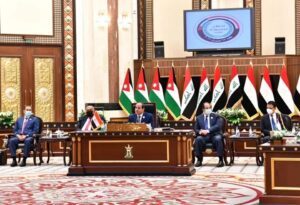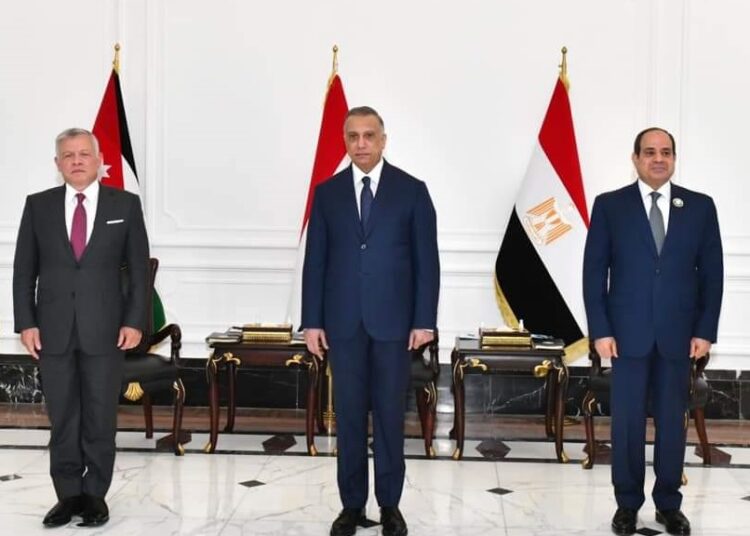Historic Egypt-Iraq-Jordan summit in Baghdad bolsters momentum of tripartite co-operation mechanism
PRESIDENT Abdel Fattah El Sisi has stressed the importance of all-out efforts by all countries of the Arab world and the Middle East to confront the challenges that threaten the region, undermine moves to restore stability and jeopardise the territorial integrity of the countries of the region.
The president’s remarks came during a tripartite summit held with Iraqi Prime Minister Moustafa Al-Kadhimi and Jordanian King Abdullah II in the Iraqi capital of Baghdad Sunday, Presidency Spokesman Ambassador Bassam Radi said. The President arrived in Baghdad early yesterday to be the first Egyptian leader to visit the Arab country in 30 years.

During the summit, the president highlighted support for carrying out strategic projects of the tripartite co-operation mechanism, especially at the political and security level in reassertion of the keenness of the three countries to maintain the momentum of activating the co-operation paths between them.
This, President Sisi said, comes while being aware of the current circumstances pertaining to the coronavirus pandemic and the accompanying precautionary measures and economic repercussions.
The three leaders discussed ways to enhance areas of economic, trade
and investment co-operation withthe aim of ushering in a new phase
of strategic integration.
The three leaders also discussed ways to enhance areas of economic, trade and investment co-operation with the aim of ushering in a new phase of strategic integration between the three countries, based on common development goals, especially in light of the strong historical and popular ties between them.
Regarding key regional issues, President Sisi, Iraqi PM Kadhimi and King Abdullah II of Jordan stressed the need to intensify consultation and coordination between the three countries in light of the successive international and regional developments.
Such developments, the three Arab leaders emphasised, require mutual co-operation to confront common challenges and dangers, especially with the rejected regional interventions that threaten Arab national security, and call for Arab solidarity and unity.
The three leaders stressed the importance of continuing efforts towards achieving more co-operation and coordination between their respective countries for the benefit of their peoples and Arab peoples as a whole.

President Sisi also affirmed Egypt’s keenness to preserve Arab water security, and welcomed the stances of Iraq and Jordan in support of the Egyptian position on Ethiopia’s dam – an issue that represents one of the priorities of Egyptian policy due to its direct threat to the Egyptian national security in various aspects.
He also reiterated that Egypt’s consistent position requires the necessity of reaching a binding legal agreement on the rules for filling and operating the dam.
The developments of the Palestinian Cause were also reviewed during the Baghdad summit, with the three leaders reiterating support for the Palestinian people to obtain their legitimate rights, including the establishment of their own independent state in accordance with the relevant international legitimacy resolutions.
The Iraqi and Jordanian leaders praised the relevant Egyptian efforts which have recently led to stopping the escalation in the Gaza Strip as well as the Egyptian initiative for the reconstruction of the Strip.
In his speech to the summit, President Sisi said that his presence in Baghdad yesterday is an embodiment of the strength of the relations between the two countries and peoples.
This historic summit hosted by Iraq, he added, comes as a continuation of what was achieved during the earlier Cairo and Amman summits, hoping that it will truly usher ties into a new phase of strategic partnership and close co-operation between the three countries in an effort to establish sustainable development and prosperity for the two peoples.
The president also emphasised Egypt’s belief in the necessity of co-operation and solidarity with Iraq, noting in this regard that Egypt is drawing on its medical capabilities to support its Arab brothers in confronting the emergency pandemic situation that the whole world is going through and that it continues in this approach emanating from its responsibilities and faith in its role towards its brothers.
Egypt, President Sisi emphasised, supports the water rights of Iraq and Jordan in facing ongoing challenges and considers that Arab water rights are an original component of Arab national security, which requires coordination and co-operation to preserve those rights.
On the Libyan issue, the Egyptian leader said that Egypt is seeking to achieve a political settlement based on the outcomes of the Berlin Summit, the Cairo Declaration and resolutions of international legitimacy and has supported negotiations that include all Libyan parties under the auspices of the United Nations.
This led to the agreement of the Libyan National Dialogue Committee in Geneva, the selection of the prime minister and the president of the presidential council and then the formation of the government.
In this context, President Sisi stressed the difficulty of achieving the desired stability without ending all external interference in Libya and the exit of foreign forces and mercenaries, with the need to continue respecting the ceasefire, leading to the Libyan elections next December.
On the Syrian file, President Sisi reaffirmed Egypt’s position that the Syrian crisis cannot be resolved militarily and that there is a need to reach a political solution that ends military operations and foreign interventions and achieves the legitimate demands of the Syrian people.
This comes with the need to preserve the unity, integrity and independence of Syrian territory and protect state institutions from collapse.
In this context, President Sisi said that Egypt supports efforts made for the achievement of a political settlement of the crisis as part of the Geneva process and in accordance with Security Council Resolution No.2254 and the efforts of the UN envoy.






Discussion about this post